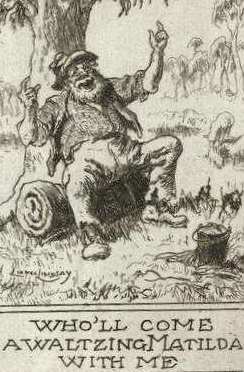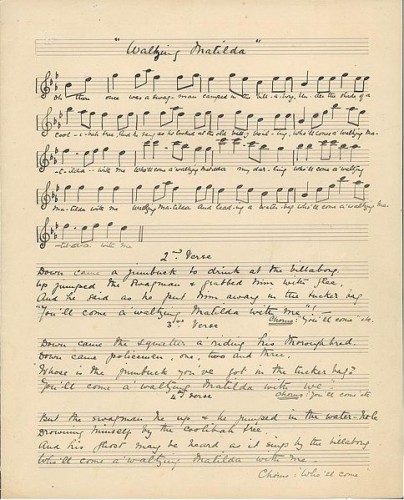The Jolly Swagman in “Waltzing Matilda” – Australia’s unofficial National Anthem

Jolly Swagman, sitting on his swag: A drawing illustrating the famous Australian folk song Waltzing Matilda
“Waltzing Matilda” is Australia’s most widely known bush ballad, a country folk song, and has been referred to as “the unofficial national anthem of Australia”.[1] It was even used during several Olympic ceremonies, as it is instantly identified around the world as Australian, whereas the real national anthem “Advance Australia Fair” is far less well known outside Australia itself.
The title is Australian slang for travelling by foot with one’s goods in a “Matilda” (bag) slung over one’s back.[2] The song narrates the story of an itinerant worker, or swagman, making a drink of tea at a bush camp and capturing a sheep to eat. When the sheep’s ostensible owner arrives with three police officers to arrest the worker for the theft (a crime punishable by hanging), the worker commits suicide by drowning himself in the nearby watering hole, and then goes on to haunt the site.
The original lyrics were written in 1887 by poet and nationalist Banjo Paterson. It was first published as sheet music in 1903. Extensive folklore surrounds the song and the process of its creation, to the extent that the song has its own museum, the Waltzing Matilda Centre in Winton, Queensland.
It has been widely accepted that “Waltzing Matilda” is potentially based on the following story:
In Queensland in 1891 the Great Shearers’ Strike brought the colony close to civil war and was broken only after the Premier Samuel Griffith called in the military. In September 1894, on a station called Dagworth (north of Winton), some shearers were again on strike. It turned violent with the strikers firing their rifles and pistols in the air and setting fire to the woolshed at the Dagworth Homestead, killing dozens of sheep. The owner of Dagworth Homestead and three policemen gave chase to a man named Samuel Hoffmeister – also known as “French(y)”. Rather than be captured, Hoffmeister shot and killed himself at the Combo Waterhole.
Waltzing Matlida
by Bajo Paterson
Once a jolly swagman camped by a billabong
Under the shade of a coolabah tree,
And he sang as he watched and waited ’til his billy boiled
“You’ll come a-Waltzing Matilda, with me”
Waltzing Matilda, Waltzing Matilda
“You’ll come a-Waltzing Matilda, with me”
And he sang as he watched and waited ’til his billy boiled,
“You’ll come a-Waltzing Matilda, with me”.
Down came a jumbuck to drink at that billabong,
Up jumped the swagman and grabbed him with glee,
And he sang as he shoved that jumbuck in his tucker bag,
“You’ll come a-Waltzing Matilda, with me”.
Waltzing Matilda, Waltzing Matilda
“You’ll come a-Waltzing Matilda, with me”
And he sang as he shoved that jumbuck in his tucker bag,
“You’ll come a-Waltzing Matilda, with me”.
Up rode the squatter, mounted on his thoroughbred,
Down came the troopers, one, two, three,
“Where’s that jolly jumbuck you’ve got in your tucker bag?”
“You’ll come a-Waltzing Matilda, with me”.
Waltzing Matilda, Waltzing Matilda
“You’ll come a-Waltzing Matilda, with me”
“Where’s that jolly jumbuck you’ve got in your tucker bag?”,
“You’ll come a-Waltzing Matilda, with me”.
Up jumped the swagman and sprang into the billabong,
“You’ll never take me alive”, said he,
And his ghost may be heard as you pass by that billabong,
“You’ll come a-Waltzing Matilda, with me”.
Waltzing Matilda, Waltzing Matilda
“You’ll come a-Waltzing Matilda, with me”
And his ghost may be heard as you pass by that billabong,
“You’ll come a-Waltzing Matilda, with me.”
“Oh, You’ll come a-Waltzing Matilda, with me.”
The song narrates the story of an itinerant worker making a crude cup of tea at a bush camp and capturing a sheep to eat. When the sheep’s ostensible owner arrives with three policemen to arrest the worker, he drowns himself in a small lake and goes on to haunt the site. The lyrics contain many distinctively Australian English words, some now rarely used outside this song. These include:
waltzing
derived from the German term auf der Walz, which means to travel while working as a craftsman and learn new techniques from other masters before returning home after three years and one day, a custom which is still in use today among carpenters.[13]
Matilda
a romantic term for a swagman’s bundle. See below, “Waltzing Matilda.”
Waltzing Matilda
from the above terms, “to waltz Matilda” is to travel with a swag, that is, with all one’s belongings on one’s back wrapped in a blanket or cloth. The exact origins of the term “Matilda” are disputed; one fanciful derivation states that when swagmen met each other at their gatherings, there were rarely women to dance with. Nonetheless, they enjoyed a dance, and so they danced with their swags, which was given a woman’s name. However, this appears to be influenced by the word “waltz”, hence the introduction of dancing. It seems more likely that, as a swagman’s only companion, the swag came to be personified as a woman.
Another explanation is that the term also derives from German immigrants. German soldiers commonly referred to their greatcoats as “Matilda”, supposedly because the coat kept them as warm as a woman would. Early German immigrants who “went on the waltz” would wrap their belongings in their coat, and took to calling it by the same name their soldiers had used.
swagman
a man who travelled the country looking for work. The swagman’s “swag” was a bed roll that bundled his belongings.
billabong
an oxbow lake (a cut-off river bend) found alongside a meandering river.
coolibah tree
a kind of eucalyptus tree which grows near billabongs.
jumbuck
a large, difficult-to-shear sheep, not a tame sheep. Implies that the sheep was not ‘owned’ by the squatter or regularly shorn, thus not able to be stolen by the swagman.
billy
a can for boiling water in, usually 2–3 pints.
Tucker bag
a bag for carrying food (“tucker”).
troopers
policemen.
squatter
Australian squatters started as early farmers who raised livestock on land which they did not legally have the right to use; in many cases they later gained legal use of the land even though they did not have full possession, and became wealthy thanks to these large land holdings. The squatter’s claim to the land may be as uncertain as the swagman’s claim to the jumbuck.
http://commons.wikimedia.org/wiki/File:Original_Waltzing_Matilda_manuscript.jpg
http://nationaltreasures.nla.gov.au/%3E/Treasures/item/nla.ms-ms9065-3-s1
With a Swag Upon My Shoulder, Black Billy in my Hand….
Another folk song featuring the swag is “With a Swag Upon My Shoulder” the tune being a variant of the Irish tune ‘Boys of Wexford’.
http://folkstream.com/100.html
With my Swag upon my Shoulder
When first I left Old England’s shore
Such yarns as we were told
As how folks in Australia
Could pick up lumps of gold
So, when we got to Melbourne town
We were ready soon to slip
And get even with the captain
All hands scuttled from the ship
Chorus
With my swag all on my shoulder
Black billy in my hand
I travelled the bush of Australia
Like a true-born Irish man
We steered our course for Geelong town
Then north west to Ballarat
Where some of us got mighty thin
And some got sleek and fat
Some tried their luck at Bendigo
And some at Fiery Creek
I made a fortune in a day
And blew it in a week
Chorus
With my swag all on my shoulder
Black billy in my hand
I travelled the bush of Australia
Like a true-born Irish man
For many years I wandered round
As each new rush broke out
And always had of gold a pound
Till alluvial petered out
‘Twas then we took the bush to cruise
Glad to get a bite to eat
The squatters treated us so well
We made a regular beat
Chorus
With my swag all on my shoulder
Black billy in my hand
I travelled the bush of Australia
Like a true-born Irish man
So round the lighthouse now I tramp
Nor leave it out of sight
I take it on my left shoulder
And then upon my right
And then I take it on my back
And oft upon it lie
It is the best of tucker tracks
So I’ll stay here till I die
Chorus
With my swag all on my shoulder
Black billy in my hand
I travelled the bush of Australia
Like a true-born Irish man
Notes: In the bush the Southern Cross constellation is also known as The Lighthouse, so tramping round this continent is in effect tramping round the lighthouse. This song, the tune of which is a variant of ‘The Boys of Wexford’, was collected by John Manifold from Father P.P.Kehoe of Kyabram, Victoria in the 1950’s.

